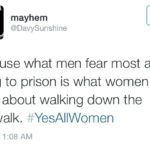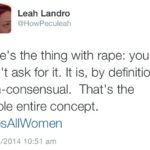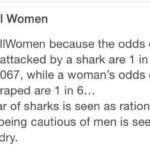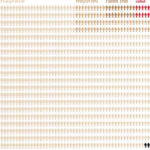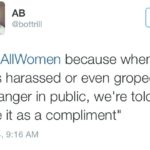“Consensual sex” is just sex. To say that implies that there is such a thing as “non consensual sex”, which there isn’t. That’s rape. That is what it needs to be called. There is only sex or rape. Do not teach people that rape is just another type of sex. They are two very separate events. You wouldn’t say “breathing swimming” and “non breathing swimming”, you say swimming and drowning.
Male survivors charge that feminists see rape as a “man vs. woman” issue… The distinction is that while many women, and some men, are victimized by rape, all women are oppressed by it, and any victimization of women occurs in a context of oppression most men simply do not understand.
For myself, I don’t need for rape to be gender neutral to feel validated as a male survivor. And I certainly don’t need to denigrate women, or to attack feminists, to explain why I was abused by the (male) police, ridiculed by my (male) friends, and marginalized by the (male dominated) society around me. It is precisely because we have been “reduced” to the status of women that other men find us so difficult to deal with. It was obvious to me at the police station that I was held in contempt because I was a victim- feminine, hence perceived as less masculine. Had I been an accused criminal, even a rapist, chances are I would have been treated with more respect, because I would have been seen as more of a man. To cross that line, to become victims of the violence which works to circumscribe the lives of women, marks us somehow as traitors to our gender. Being a male rape survivor means I no longer fit our culture’s neat but spacious definition of masculinity, as one empowered, one always in control. Rather than continue to deny our experience, male survivors need to challenge that definition.
Fred Pelka, “A Male Survivor Breaks His Silence”, from On The Issues Magazine Spring 1992
[submitted by quirkymitochondria], thanks for sharing this quote!
(via misandry-mermaid)
Linked to the article above – y’all should be giving On The Issues credit for this fantastic article!
(via rhrealitycheck)
Dear #notallmen,
I’m going to pose a question to you. It’s quite simple really.
Are you a rapist?
I’m assuming the answer is a resounding no, since in response to the tragic mass shooting in California over the weekend you immediately had to remind us all that NOT ALL MEN hate and assault women. In response to a man who hated women so much he went on a shooting spree as ‘retribution’ for them rejecting him, you had to get out and start a hashtag to defend men.
But how sure are you that are one of those men? How sure are you that you’ve never sexually assaulted a woman, whether you meant to or not? Are you 100% sure?
The person who sexually assaulted me has no clue that is what he did. At the time I didn’t even think about the words ‘sexual assault’ in relation to what happened to me. But at the time of the incident, and afterward, I did not want it to be happening. I was 17, had been drinking and he was my boyfriend. I didn’t say no, I just lay there unresponsive, wishing it would stop. I never told anyone what happened.
I doubt he even remembers that night, but I can’t forget it.
The stories are the same for so many women.
From the girl who was worn down so much by the constant manipulation by her boyfriend that she finally said yes, to the woman too drunk to resist, to the mother who only sleeps with her husband out of fear of further abuse.
You could be that man. You may not have meant it, or realised it, but someone could have left a sexual encounter with you feeling assaulted or violated without you ever having known it. It’s possible you actually are #yesallmen.
But then, how do we stop this occurring?
On Sunday night, the feminist writer and speaker Clementine Ford gave a talk at the Australian National University on affirmative consent. She spoke about how consent is discussed in the wrong way, that consent is considered the absence of a no.
The opposite of no isn’t the absence of it being said. The opposite is someone saying yes.
Clementine asked the women in the room to raise their hands if they had ever been verbally abused or harassed in public by men. Almost every woman in the room raised her hand. These men wouldn’t give a second thought to how their catcalls and verbal abuse affects the women subjected to it. They see it as ‘just a bit of fun’ whilst women feel scared and threatened. They have no understanding of the fear associated with
I understand the feeling of needing to defend yourself. You think you’re a good guy. You would never do that.
“I’ve never physically harmed a woman in my life #NotAllMen” – @JustinLyft
“Eliot Rodgers was a lunatic. He would of killed any group that he felt mistreated him #notallmen” – @MikeyManker
“People don’t realize that men hate rapists as much as women do. Like even other prisoners hate them, so not all men are the problem.” – @bloomsburgprep
Redefine your definition of rape. Rape isn’t always physically violence. Women aren’t always attacked in the street and left bruised. Sexual assault is where there is an absence of consent. How many times have you had that absence of a no?
So think about it now. How sure are you that you’re not a rapist?
90%? 80%? Less?
Lauren
A few months back, I was asked to participate in a debate on the topic of whether men should have to pay on dates. (I was “the feminist.”) It turned out that the male debater and I didn’t really disagree much on that topic. I said that, generally, whoever asks the other person out pays for that date, and then at some point couples generally transition into sharing costs in whatever way works for them. He was actually pretty happy to pay for first dates; he just wanted women to say thank you and to not use him. I had no problem with that.
I think he said that women should offer to pay half, knowing they’ll probably be turned down. I said, well, sometimes — but what if the other person invited you someplace really expensive? What if you agreed to a date with the guy and he spent an hour saying crazy racist shit to you and you felt like you couldn’t escape? This is what led to our real disagreement.
The male debater felt strongly that if a woman wasn’t interested in a second date, she should say so on the spot. If the man says, “Let’s do this again sometime,” the woman shouldn’t say, “Sure, great,” and then back out later. I said that that was a nice ideal, but that he should keep in mind that most women spent most of their lives living in low-level fear of physical aggression from men. I think about avoiding rape (or other violence) every time I walk home from the subway, every time there’s an unexpected knock at the door, and certainly every time I piss off an unhinged man. So, if I were on a date with a man who I felt was unbalanced, creepy, overly aggressive, or possibly violent, and he asked if I wanted to “do this again sometime,” I would say whatever I felt would avoid conflict. And then I would leave, wait awhile, and hope that letting him down politely a few days later would avoid his finding me and turning my skin into an overcoat.
The male debater was furious that I had even brought this up. He felt that the threat of violence against women was irrelevant, and that I was playing some kind of “rape card” as a debate trick. He got angrier and angrier as we argued. I also got angrier and angrier, although I worked hard to keep speaking in a calm and considered way. He was shouting and cutting me off when I tried to speak. I pointed out that the debater himself was displaying exactly the sort of behavior that would make me very uncomfortable on a date. THAT made him livid.
He then called me “passive-aggressive.”
I was genuinely taken aback. “Actually,” I said, “I call this ‘behaving myself.’” It’s a lot of work to stay calm when you’re just as furious as the other person, and that other person is shouting at you. I felt that I was acting like a grownup — at some emotional cost to myself — and I wanted credit, not insults, for being able to speak in a normal tone of voice when I was having to explain things like, “We can’t tell who the rapists are before they turn violent, so sometimes we have to be cautious with men who do not intend to harm us.”

